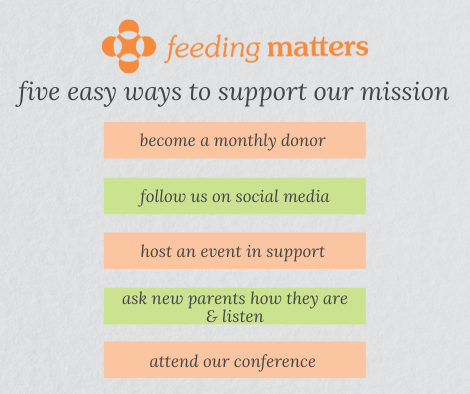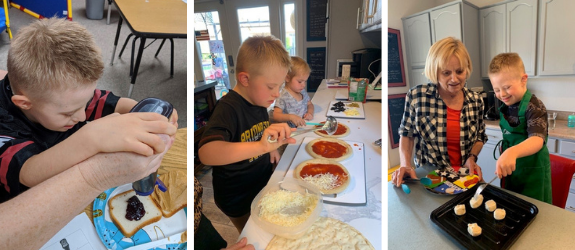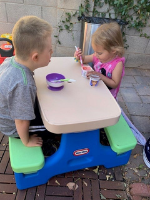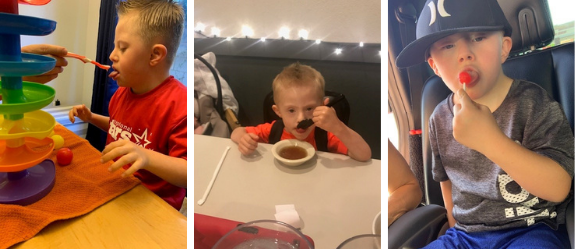Category: Uncategorized
Celebrate PFD Awareness Month with Us
Published by Jaclyn Pederson, MHI on May 24, 2022
Dear friends of Feeding Matters,
As you may know, we have been celebrating Pediatric Feeding Disorder (PFD) Awareness Month since May 1. In its 4th year, this month has become a huge celebration within the Feeding Matters team and community. We recognize and honor the progress we’ve made since our founding 15 years ago. But we know that there’s much more to do and this month, we ask for your help to raise awareness and reach more families in-need.
Time and time again when a family finds our resources and community of support they breathe a sigh of relief. Relief to know that there are others out there struggling like they are, that they are not alone. Relief that they do not have to hide behind closed doors anymore. When a child is struggling with feeding, it can be very difficult for a family to talk about those struggles for fear of shame or judgement. Or, as we see in many cases, families are met with opinions from others on “how” to get children to eat, implying that a family isn’t already doing everything in their power to nourish their children. This is one of the reasons why awareness of PFD is so important. Awareness is a means to inclusion. If enough people know what PFD is, we can begin to change the public perception when a child is on a feeding tube, needs feeding therapy, or is a “picky eater.”
You have a very important role this month in helping changing the lives of children with PFD. How many followers do you have on social media? If sharing PFD Awareness Month with your audience could help just one family find the care and support they need, wouldn’t it be worth it? It takes all of us within this community to #callitPFD and help families feel welcome, and breathe a sigh of relief.
Thank you for helping us raise awareness of pediatric feeding disorder this month!
Sincerely,
Jaclyn Pederson, MHI
CEO
Maternal Mental Health Awareness Month
Published by Feeding Matters on Apr 27, 2022
Did you know May is PFD Awareness Month and Maternal Mental Health Awareness Month? At Feeding Matters, we are getting ready to raise awareness for these two issues we are passionate about! In recognition of the toll PFD can take on families, we bring you a message from the mother of a child with PFD.
As I sit here next to my beautiful child with pediatric feeding disorder (PFD) the psychological damage caused from going on this journey with him sits next to me. I know it will always be with me. It is the reason I will never try to have any more children. But how do I make it bearable to sit by? How do I accept it without letting it cause me more harm? Maternal mental health is at the forefront of this question. Finally starting to share my experiences has helped me. What helps you? If you don’t know, reach out. Whether it’s PFD or not, all mothers struggle with something. Don’t struggle alone. Whisper, or scream if you have to, but get it out. Don’t let the fear, anxiety, or depression chisel away at the beauty that is you, mommy.
My best friend Jenna says it best, “Seeking support is a sign of strength. Our children need us, we need us too. Sometimes it feels like one more thing in a long list of things we have to do.” But do it we must. We will be healthy again, maybe not today, but one day. Don’t be ashamed of your struggles or perceived inabilities. Motherhood is all about learning. Who is your teacher? Look around you, help is closer than you think. So, for now, I say goodnight to the damage sitting next to me. I’m hopeful when I wake up it won’t be sitting as close. And maybe, one day, she will walk out of the door for good.
1 in 8 mothers experience symptoms of maternal depression (NICHQ, 2021). 1 in 37 children have pediatric feeding disorder. Your feeding experience with your child may be affecting your maternal mental health. Attend the IPFDC to share experiences and learn what help is available.
Celebrating 15 Years and Looking to the Future
Published by Jaclyn Pederson, MHI on Mar 15, 2022
Dear Friends of Feeding Matters,
The last time I wrote to you, I acknowledged that the season I was in felt difficult. It was a new year, but things didn’t feel new. Things felt challenging and daunting. Now, however, with the spring air, our upcoming conference, and the continued growth in the recognition of PFD, I am feeling renewed, as one should as we emerge from our winter slumber. As we make plans to enjoy the coming seasons, I am excited so share the plans we’ve made for Feeding Matters.
Last year we leveraged your input through community driven change questions and during the International Pediatric Feeding Disorder. We took that input and partnered with our organization’s leaders to develop our strategic plan through 2026. We know that PFD afflicts more than 1 in 37 children under the age of 5 in the United States each year, yet the disorder is still largely unknown and misunderstood. Therefore, this plan is focused on raising awareness of PFD by educating the healthcare community and informing the public about this often invisible disorder to support early identification.
To achieve our goal of PFD becoming a household name like other childhood conditions, we are focused on three interrelated activities:
- Digital First: Spread PFD throughout digital platforms worldwide so audiences know PFD and Feeding Matters, and have the necessary resources to support their family or professional life.
- Community Driven: Leverage an impassioned base of families, healthcare professionals, and community members to ensure our content, awareness, and consensus efforts are in line with the community’s needs. This includes pursuing additional research in the field and supporting the early identification of PFD.
- Targeted Media Outreach & Storytelling: Tell the PFD story through the media and additional means so that PFD awareness reaches those who are not directly touched by the disorder. Leverage grassroots outreach to build impactful partnerships that grow awareness with the general public.
These efforts will require the involvement of our entire PFD community. We will continue to share updates with you and seek feedback. Everything we have accomplished as an organization thus far has been the result of an incredible amount of passion, commitment, and collaboration from our supporters. Accomplishing this plan will be no different. Over the next several months (and years!), we will be asking for your help, but one of the most vital things you can do is to please follow us on social media and like, comment, or share to help us spread our message. This work happens because of YOU and we are excited to step into the future together.
Best wishes,
 Jaclyn Pederson, MHI
Jaclyn Pederson, MHI
Chief Executive Officer
5 Ways to Include Feeding Matters in your New Year’s Resolutions
Published by Feeding Matters on Jan 24, 2022
We have many exciting things to share with you at the start of this new year and many opportunities for you to get involved! Our mission is Furthering advances in pediatric feeding disorder by accelerating identification, igniting research, and promoting collaborative care for children and families – and we will always stay laser focused on that mission. Thank you for embracing a new year of challenges and a new year of opportunities with us.
 Become a monthly donor
Become a monthly donor
Monthly donors are like your very own subscription to support Feeding Matters and the families we serve. What’s a better way to support than to keep us top of mind every month? For even $10/month, you can make a huge impact in the lives of families and children with PFD. Your donation goes to support our four pillars of Education, Advocacy, Research, and Family Support.- Follow us @feedingmatters and like, comment, or share!
One of the best ways we can spread awareness about pediatric feeding disorder is through social media. So be sure to follow us on social channels @feedingmatters and interact with us, we’re all in this together! - Host an event to support Feeding Matters and spread PFD Awareness!
Ready to take your support to the next level? Consider hosting an event fundraiser for Feeding Matters. These events raise vital funds and build awareness to help create a world where children with PFD will thrive. If you are interested in hosting an event, we are here to share our materials with you to make it a success. Please email us at events@feedingmatters.org if you would like to learn more. We’ll be sharing some of the events taking place across the country with all of you in future newsletters as these events are critical to our success! - Ask new parents how feeding is going…and listen when they respond
Time and time again, we hear from families that they felt alone in their PFD journey or that their family and friends could not understand. So one of the biggest ways you can support any family with an infant or child is to just be there. To listen without judgment and without advice. Your presence can be the thing that helps a parent or caregiver know that they are not alone. - Attend the International PFD Conference
If you are a family member or a healthcare professional, you will find what you are looking for at the International PFD Conference. While this event is available on-demand, you’ll want to block out your calendar for the days if you can as you will not want to miss the flurry of conversations from passionate people across the world. This short event makes an impact that lasts throughout the whole year.
Celebrating Wins – the Mieras Family
Published by Feeding Matters on Dec 22, 2021
Join us as we celebrate wins, big and small, for families facing PFD! Today, we celebrate the wins of Jax Mieras! Jax’s parents have attended Feeding Matters’ conferences and received support through the Power of Two program. His mother, Amber, now volunteers as a family coach in the Power of Two program.
Our PFD journey has, like many others, been full of hills and valleys. We have had growth, and regression, over the last 7 years. We are have learned to celebrate the successes, no matter how small, and honor where Jax and our family is in the journey. We have learned to be grateful for the support we have, for the medical assistance we have to help keep Jax healthy, all while trying to continue to grow as a family.

Jax received his first feeding tube at 4 months old and we held onto hope that he would be eating soon. First it was, after we got his GERD under control he would eat, then we were told that after his open heart surgery he would be eating. Then we were told that after his sister starting eating, he would start eating. We have learned to no longer think our experiences and journeys would be just like other children with PFD. Each case is so different and each child progresses on their own time.
Jax has gone to therapy for 7 years, we have participated in intensive programs and out-patient programs, and we are finally getting Jax more comfortable being around food and participating in the family meal experience. While he still has anxiety being around new foods and doesn’t want to bring a lot to his mouth, he has come leaps and bounds with wanting to sit with us at dinner and eat. (Although our meals usually involve prepping feeding tools, preferred and non-preferred foods, a task that we can use as a reward, and more). Jax also has started enjoying playing “kitchen” and making food with us.


Our journey has taught us that it isn’t just Jax’s PFD journey, but something that involves our entire family. His sister, Nayeli, is great at encouraging Jax and celebrating with us when we have a great meal. We celebrate things like Jax drinking water, eating and playing with food at school, and asking for our family to enjoy a meal at the table together. We are thankful to have family members that understand where we are, and therapists and teachers that help encourage Jax to continue with his growth.
From not being able to be near food, to enjoying condiments like syrup and ketchup, to being happy to lick a sucker, taking a sip of water while playing outside, to putting crumbs in his mouth, we are making progress….and Jax is happy. We do have difficult moments when trying new things or challenging Jax more, but he is getting more and more confident.
We know our journey will be a long one, that will most likely involve feeding tubes, therapies, tears and high-fives. But this is where we are….and while it is hard, it has shown us how strong our family, and out son is.

Thank you for letting us celebrate with you, Mieras Family!
Reaching our Vision Together
Published by Jaclyn Pederson, CEO on Nov 18, 2021
Dear Friends of Feeding Matters,
We’ve had an active past few months as we work to close out 2021 successfully. Hopefully, you’ve been able to take some time to view Easton’s story as the first child diagnosed with pediatric feeding disorder (PFD) in the United States, or participated in our Annual Community Event, or even used some of our resources available in the PFD ICD Tool Kit. Thank you for your part in supporting these latest updates and events. This continues the culmination of years’ worth of work to create momentum behind PFD. Now, we prep for 2022 to ensure we sustain and grow this momentum and ultimately reach even more families.
Saying thank you and sharing our gratitude to our community of supporters is something that we try to do often but to be honest, it never seems enough. The Feeding Matters community spans state lines, professional disciplines, parent experiences, and philanthropic support. We reach all 50 states and over 42 countries as we build a community of inspiration, dedication, and commitment to creating a world where children with PFD will thrive. Reaching our vision takes all of us working together and we could not do this without you so thank you for your participation and support!
Sincerely,

Jaclyn Pederson, MHI
Chief Executive Officer
A letter from our CEO
Published by Jaclyn Pederson, Feeding Matters CEO on Sep 30, 2021
Friends of Feeding Matters,
Innovation is often viewed as a buzzword. But, when innovation is one of your organization’s values, it needs to be so much more than a buzzword. At Feeding Matters, we do not believe in doing things the way they always have been done. If we did, there wouldn’t be the need for a new PFD diagnosis. We believe in approaching problems with a creative and collaborative lens. We take the initiative to leave comfort zones, embrace new ideas, and generate change.
Tomorrow, the impact of innovation will be felt all around the United States as all children struggling with feeding will be eligible to receive the formal pediatric feeding disorder (PFD) diagnosis on their medical records. Tomorrow is a new day for the feeding community. It is not the end, but rather a new beginning.
And that value will guide the Feeding Matters team and community to continue innovating to reach our vision of creating a world where children with PFD will thrive. As always, thank you for being a part of this journey with us.
Sincerely,
 Jaclyn Pederson, MHI
Jaclyn Pederson, MHI
Chief Executive Officer
PFD is not Rare
Published by Jaclyn Pederson, MHI Feeding Matters CEO on Jul 22, 2021
Dear Friends of Feeding Matters,
As I meet with people in the community, I hear “the feeding community is so small” from those who are well-aware of pediatric feeding disorder (PFD) or “how many have PFD, it must be a rare disorder right?” from those who are just being introduced to PFD. Neither of these are true. In fact, we all know someone personally affected.
More than 1 in 37 children have PFD under the age of 5 in the US annually. PFD is more prevalent than Autism and Cerebral Palsy. Families feel alone. Healthcare professionals need education. PFD needs more awareness.
I have been with Feeding Matters in various roles for over 8 years. Looking back at the work we were doing when I started with the organization in 2013, I can see that things looked so different for us then. It is easy to forget how far this organization has come. From our beginning, we were supporting families through our Power of Two program and providing information and resources on our website, but we continued to run into the barriers that existed – no one taking this issue seriously. Now I think of the work of this whole community and what it is like for us today. We have come a long way. In the last few months, we had a successful conference, an exciting PFD awareness month, and are preparing for when PFD officially becomes a stand-alone diagnosis in the US in Oct 2021.
Now, those barriers still exist but we continue to chip away at a very large mountain. One day, I’ll be meeting with people in the community, and they will not meet me with the word “rare”. Soon, the general public will know about Feeding Matters and PFD. Thank you for your support and partnership in this work.
Best wishes,
Jaclyn Pederson, MHI
CEO
May is PFD Awareness Month
Published by Jaclyn Pederson, Feeding Matters CEO on May 04, 2021
Dear Friends of Feeding Matters,
We live and breathe by the stories of our PFD community. The stories of triumph, of progress at any cost, and even the stories of lost weight or a progress plateau.
Unfortunately though, sometimes the story is that a family has found us when they have already been struggling for quite some time. While it is not too late at any point in a family’s journey to find Feeding Matters’ support, we do hope that families can find us at the start of their journey and are actively working in many ways to ensure this is the case for families.
The first couple years of our journey with PFD brought many challenges and questions that seemed to isolate us. Finding Feeding Matters brought us much-needed resources and comfort – we were no longer alone navigating PFD. Now I volunteer with Feeding Matters to bring their support to others struggling with PFD; hopefully easing journeys and perhaps improving outcomes. -Brandt Perry, Family Advisory Council Chair
PFD Awareness is key to supporting families, educating professionals, and changing the system of care. Due to this, we have decided to move PFD Awareness Month to May to bring even more recognition and impact to this issue for years to come. Therefore, this May we encourage you to follow us on social, share your own stories, and empower others to learn more about this condition that affects more than 1 in 37 children under the age of 5 in the United States each year.
This May and even June, we commend our PFD community, honor our partners, and celebrate the caregivers. So, this Mother’s and Father’s Day, we celebrate all caregivers, whoever you are. We see you – your strength, your courage, your love. We are amazed by you.
Best wishes,
Jaclyn Pederson, MHI
CEO
The Registered Dietitian as a PFD Resource
Published by Alayne Gatto MS MBA RD CSP LD CLC FAND, Medical Science Liaison, RB Mead Johnson Nutrition on Apr 01, 2021
“Is my child just being picky?” This is a question that parents and caregivers may often ask themselves when mealtimes become a struggle. And indeed, there are times when an infant or child just finished a growth spurt and seems to be eating less. Or when a toddler refuses most foods except ones of a certain color or texture, which is called a “food jag”. A food jag is often a normal part of childhood development. But when does it become “not normal”?
A Pediatric feeding disorder (PFD) is defined as impaired oral intake that is not age appropriate, lasts at least 2 weeks, and is associated with medical, nutritional, feeding skill, and/or social-emotional challenges.1
There is often an underlying reason for the pediatric feeding disorder that needs to be uncovered. A registered dietitian who specializes in pediatrics is a qualified heath care provider to work with you and your child. They are a credentialed specialist who can assess your child’s growth and nutrition needs. A nutritional assessment may include several components:
- Medical history
- Diet history
- Medical tests or procedures
- Laboratory values
- Anthropometric measurements (weight, length, head circumference)
- Physical examination
A registered dietitian may also complete a behavioral and feeding disorders assessment that identifies:
- Limited food variety acceptance (color, texture, smell)
- Limited tolerance to enteral nutrition (vomiting, diarrhea, constipation)
- Aversion to foods/beverages
- Mechanical issues (gagging, choking, aspiration)
- Neurological (failed swallow study)
- Inadequate enteral intake (food refusal at meals, prolonged feeding times, muscle wasting)
A complete assessment is more critical in a pediatric patient versus an adult patient because children can become malnourished quicker than adults. Children have lower body fat, lower muscle mass, but high calorie requirements. Risk for inadequate nutrition increases when a child is not consuming sufficient key nutrients like protein, fat, iron, calcium, and Vitamin D. This is important because children, especially in the first 1000 days of life, are undergoing a period of rapid brain growth which is the foundation for optimal development, a key factor in long-term health.2
Registered Dietitians are a specialist that your doctor and/or insurance provider can refer you to. Registered dietitians may work in private practice, in hospitals and in specialized feeding team clinics. They may also be employed by companies that manufacture formula and food supplements. Early Intervention, Head Start, and the WIC program are government entities that may have registered dietitians as part of their staff. They are a valuable resource to support you and your family!
References
1. Goday PS, Huh SY, Silverman A, Lukens CT, Dodrill P, Cohen SS, Delaney AL, Feuling MB, Noel RJ, Gisel E, Kenzer A, Kessler DB, Kraus de Camargo O, Browne J, Phalen JA. Pediatric Feeding Disorder: Consensus Definition and Conceptual Framework. J Pediatr Gastroenterol Nutr. 2019 Jan;68(1):124-129. doi: 10.1097/MPG.0000000000002188. PMID: 30358739; PMCID: PMC6314510.
2. Schwarzenberg SJ, Georgieff MK; COMMITTEE ON NUTRITION. Advocacy for Improving Nutrition in the First 1000 Days to Support Childhood Development and Adult Health. Pediatrics. 2018 Feb;141(2):e20173716. doi: 10.1542/peds.2017-3716. Epub 2018 Jan 22. PMID: 29358479.